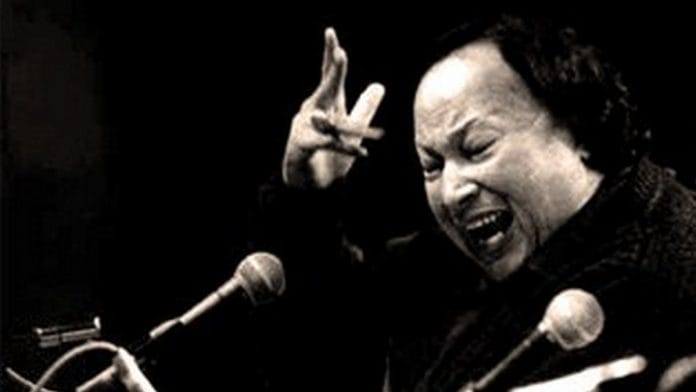Nusrat Fateh Ali Khan’s voice reached every nook and cranny in the world. In Tokyo, he was hailed as the singing Buddha. In Los Angeles, he was the voice of paradise. In Paris, he was recognised as the Pavarotti of the East, and in London, he embodied the spirit of Islam. In Tunis, he was considered the quintessence of the human voice. And in Lahore he was Shahenshah-e-Qawwal.
His biographer, Dr Pierre-Alain Baud, who spent several years in the Qawwali maestro’s company, lists the accolades and honours awarded to Nusarat in his book, Nusrat—The Voice of Faith.
Khan’s name is synonymous with the ancient and divine art of Qawwali singing, which is a form of Sufi Ibadat (worship). He took the traditional art form beyond South Asia’s borders. There are instances of people getting up from their seats in awe and offering donations on stage so that he could keep singing.
From ‘Afreen Afreen’ to ‘Mai Ni Jana Jogi De Naal’, from ‘Nit Khair Manga’ to ‘Allah Ho’, there are numerous Qawwalis, Ghazals sung by the exceptionally talented man, each more famous than the other.
But Nusrat Fateh Ali Khan’s fate would have been very different if he had followed his father’s advice.
Also read: Jatt hip-hop to Dalit pop – How caste seeped into Punjabi music
The ‘Singing Buddha’
Born in 1948 in Faisalabad to Qawwal Bachchon Ka Gharana, a Qawwali group of 12 children said to have been assembled by Sufi poet Amir Khusro in the 13th century, Nusrat was not expected to walk in the footsteps of his forefathers. His father Ustad Fateh Ali Khan wanted him to study and become a doctor or engineer. Fortunately for the world, the legend remained true to his calling.
Originally hailing from Afghanistan’s Ghazni, Nusarat’s forefathers migrated to India with a saint called Sheikh Darvesh and settled in Jullundhar (now Jalandhar). Music was their profession, and way of life. Young Nusrat insisted and joined his father’s Qawwali party as a tabla player and learnt the intricacies of singing alongside.
After his father’s death, Nusrat gave his first performance at his one-year death anniversary in 1965 at the age of 17. That year was special for the young singer. That same year, he performed in the Jashn-e-Baharan (Festival of Spring) arranged by Radio Pakistan Lahore in front of legends such as Ustad Bade Ghulam Ali Khan, Ustad Umid Ali Khan, Roshan Ara Begum, Ustad Amanat Ali Khan. They praised him. Khan did not look back.
His countless performances across the region transported listeners. His impeccable vocal range and immersive style of singing became the talk of the town, and not just in South Asia. In 1985, he performed at the World of Music, Arts and Dance (WOMAD) festival in London. People in Japan would attend his performance barefoot out of respect for the ‘Singing Buddha’, those in France would find themselves transported to another world without even understanding a word of what he was singing, and the Americans would stand up and dance in the aisles to the fast-paced hypnotising beats of his qawwali.
Also read: A star is born in Pakistan—Ustad Chahat Fateh Ali Khan
The innovative Qawwal
Nusrat Fateh Ali Khan was not just a Qawwali singer, he was also an innovator in music.
According to Pakistani author Adam Nayyar, once during a tour in Japan, Nusrat kept watching TV commercials before his concert. When asked why he was doing so, Khan responded that he was spotting the ‘most effective’ music the Japanese used in their commercials to attract buyers. Nayyar observed that in the next concert in Japan, Khan infused those Japanese melodies into his Qawwalis.
But before he mesmerised foreign audiences, he was not hailed as one of the greatest by a certain section of Pakistanis, especially the elite. For them, his music sounded like cacophony and was too loud for their taste.
“You know this perfectly good cloth they make in Faisalabad. People won’t buy it unless you stamp ‘Made in Japan’ down the side. I’m just like that cloth for the ‘gentry’,” the maestro commented.
Also read: A Kumaoni Dalit is singing Qawwali in Delhi, won’t let folk music trap him in his caste now
Taking Qawwali beyond South Asia
Qawwali, a traditional form of divine music, is staunchly guarded by conservatives. Nusrat Fateh Ali Khan’s decision to take this art form abroad was criticised by some, but the Ustad (master) had a befitting response.
“Many have said I have compromised my faith by coming to the West. But this is not so. To travel the world and open the hearts of those whose were previously closed is a joy worth the other sacrifices,” he once told American journalist Andy Carvin.
Khan also collaborated with English musician Peter Gabriel and American singer Eddie Vedder. Musician Don Heckman wrote about how his concerts felt like in 1996.
“Almost before realizing what is happening, the audience—despite its unfamiliarity with the verbal messages of Khan’s devotional songs—is quickly swept up in the emotional fervor of the music,” Heckman wrote.
In just 48 years of his life, Ustad Nusrat Fateh Ali Khan left an indelible mark in South Asia. Even after more than 25 years of his demise, his music continues to keep enthralling generations of listeners and those who wander into the lanes of Pakistani music and Coke Studio on YouTube at night.






